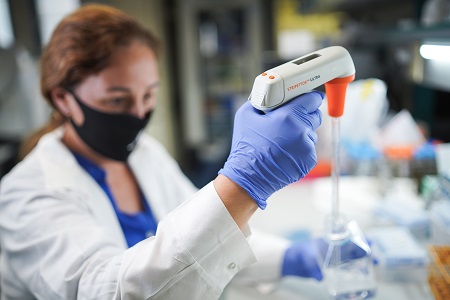

MyBiotics Pharma Ltd., a microbiome therapeutics company, and Hadasit, the Hadassah Medical Organization’s technology transfer company, have entered into a collaboration and licensing agreement for the identification of microbiome-based therapies to enhance the success of immunotherapy for melanoma patients. A microbiome is a community of microorganisms, such as bacteria, fungi, and viruses, that inhabit a particular environment in the body.
The collaboration combines Hadassah’s know-how and expertise in immunotherapy treatment with MyBiotics’ proprietary microbiome technologies. The two-year joint research project, funded by MyBiotics, will be conducted by researchers from the company and an oncology team from the newly established Hadassah Cancer Institute, headed by Prof. Michal Lotem, also director of Hadassah’s Center for Melanoma and Cancer Immunotherapy.
Prof. Lotem comments, “For years I have strived to study what was driving long-term survival of melanoma patients who did well beyond expectations. This collaboration gives us advanced molecular and genomic tools to analyze treatment success. After years of studying how cancer deceives us, I cannot wait to translate lessons of the past to therapies of the future.”
In the past five years, studies have elucidated the possible contribution of the microbiome to cancer development and its influence on a patient’s response to treatment. Research findings have pointed to differences between microbiomes of patients who respond to immunotherapy and those who do not. In animal models, tweaking the microbiome or adding secondary metabolites, organic compounds produced by the gut bacteria, has influenced the efficiency of cancer immunotherapy. These findings and others support the potential of changing the microbiome composition as a tool for both improving the efficacy and reducing the toxicity of immunotherapy in cancer patients.
The research will assess the composition of the gut microbiome and secondary metabolites in up to 100 melanoma patients who have been treated with PD-1/PD-L1 checkpoint inhibitors. Some of these patients have already exhibited a long-term response to the treatment. Using stool and blood samples, the researchers will identify microbiome components that promote treatment success. David Daboush, the chief executive officer explains, “In this collaboration with Hadassah, we will leverage Mybiotics’ Super Donor whole microbiome recovery technology in combination with the MyLiveIn computational and predictive tools to unravel new layers of understanding that will enable the design of effective microbiome-based therapeutics.”
